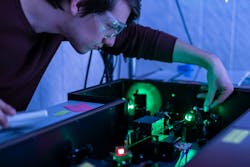Researchers approach industry for test metrics to measure the utility and efficiency of quantum computing
ARLINGTON, Va. – U.S. military researchers are asking industry to find new ways of measuring the long-term utility of next-generation quantum computing technology for aerospace and defense applications.
Officials of the U.S. Defense Advanced Research Projects Agency (DARPA) in Arlington, Va., have issued a broad agency announcement (HR001121S0026) for the Quantum Benchmarking program.
DARPA wants to know if industry could design application-specific and hardware-agnostic benchmarks to test the utility of and best applications for quantum computers, as well as estimate the hardware resources necessary for quantum computing operations.
Future generations of quantum computers are expected to solve computing problems of unprecedented size and complexity, or those that today's most powerful computers are unable to solve. Quantum computing represents a new computing paradigm that capitalizes on the quantum mechanical phenomena of superposition and entanglement to create states that scale exponentially with number of quantum bits.
Related: Army launches program to advance quantum computing techniques for parallel processing
Experts believe that quantum computers within the next few decades will revolutionize scientific and technical fields like machine learning, quantum chemistry, materials discovery, molecular simulation, many-body physics, classification, nonlinear dynamics, supply chain optimization, drug discovery, battery catalysis, genomic analysis, fluid dynamics, and protein structure prediction.
For some of these examples, quantum computers are expected to be useful simulators. In others, quantum computers will be expected to handle combinatorial complexity that is intractable for conventional computers.
What today's computer scientists don't know, however, is what size, quality, and configuration of quantum computer would enable kinds of advances that military systems integrators will need in the future.
Still to be answered are questions like what applications could benefit most from quantum computing, and at what kind of scaling; how can systems integrators understand the new core computational capability of quantum computing; and what kind of metrics and testing procedures do scientists need for quantifying progress towards quantum computing capabilities.
Related: The future of artificial intelligence and quantum computing
That's where the DARPA Quantum Benchmarking project comes in. The project seeks to distil benchmarks for quantum utility to be useful for specific applications at specific scales -- especially using the kinds of metrics that suitable for driving research and development.
The Quantum Benchmarking program will create new benchmarks that quantitatively measure progress towards specific computational challenges. In parallel, the program seeks estimate the computer hardware necessary to measure benchmark performance. The project's benchmarks will be hardware-agnostic for problems where quantum approaches most likely will be needed.
The Quantum Benchmarking program will quantify the long-term utility of quantum computers by solving some hard problems from a list of application in a variety of military domains, and grouping these application by common enabling capabilities.
The project also will develop test procedures for quantifying progress in research; create scalable multi-dimensional benchmarks; and develop tools for estimating necessary quantum hardware resources for hard-to-achieve military capabilities.
Related: Trusted computing and the challenges of cryptographic algorithms in quantum computing
From industry, DARPA researchers want analysis of applications that require large-scale, universal, fault-tolerant quantum computers; estimates of the classical and quantum resources necessary to execute quantum algorithms on large-scale; applications of fault tolerance and error correction; and nontraditional quantum computing paradigms.
The Quantum Benchmarking project has two technical areas: hardware-agnostic approaches, and hardware-specific approaches.
Companies interested should submit abstracts no later than 11 May 2021, and full proposals no later than 22 June 2021 to the DARPA BAA website at https://baa.darpa.mil/my.policy. More information is online at https://beta.sam.gov/opp/b421419cb4d0485baf0c28ee62a9e7b0/view.
About the Author
John Keller
Editor-in-Chief
John Keller is the Editor-in-Chief, Military & Aerospace Electronics Magazine--provides extensive coverage and analysis of enabling electronics and optoelectronic technologies in military, space and commercial aviation applications. John has been a member of the Military & Aerospace Electronics staff since 1989 and chief editor since 1995.
